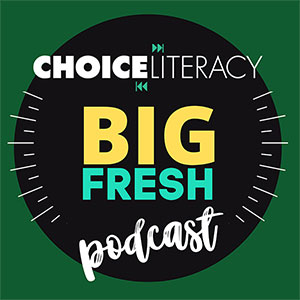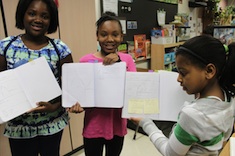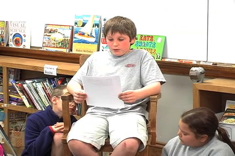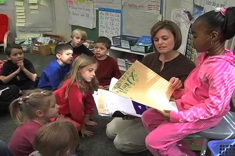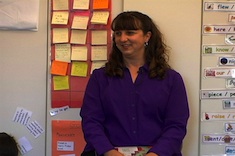In this podcast, Ruth Ayres chats with Franki Sibberson about the importance of writing celebrations in her classroom. Ruth is the coauthor (with Stacey Shubitz) of Day by Day: Refining Writing Workshop Through 180 Days of Reflective Practice.
A full transcript is available below the player.


Franki Sibberson: Ruth, you’re working on some new ideas around celebrations and writing. Can you talk a bit about your interest in this? Why you think celebrations around writing are important?
Ruth Ayres: Well, writing is so hard and the thing that sustains me as a writer is just delighting in the process and being excited about the work that I’m doing and being able to get some response about the work that I’m doing. And so as I was realizing that about myself, it made me think about the kids in our classrooms and how they really need to have this response and be able to really rejoice in their work.
The other thing that really has piqued my interest in celebration is just being a blogger and how much the comments fuel me as a writer. And so those two things have made me think about what can we do in classrooms to give kids these same things.
Franki Sibberson: That makes sense. So do all writing celebrations have the same purpose? Is it all about response or do you have different ways to think about it?
Ruth Ayres: I’ve been thinking a lot about celebrations having three parts. So, the response part where you’re getting some sort of response to your writing or to the things you’re doing as a writer. And then this piece that’s reflection where you’re reflecting on who you are as a writer or maybe how you’ve grown as a writer or maybe what your goals are.
So I think that celebration should include a piece of reflection. So, you have a response and a reflection and then also this time to rejoice and just kind of breathe and kick back a little bit and say, “Wow, we’ve done this.”
Franki Sibberson: Yeah, we forget it and just kind of move on to the next thing some time in schools.
Ruth Ayres: Yeah, we do and just to say, “Wow! I did this.” Or, “I’ve never written a feature article before and now I have,” and just to really soak in that moment.
Franki Sibberson: That’s a great purpose. So what is different about the ways you’re celebrating writing now than the ways you thought about it in the past?
Ruth Ayres: Well, in the past I always thought that they had to have this really beautiful piece of writing to celebrate and it goes against everything else that I would do in writing workshop which would be based on the writer. And then we’d get to the celebration and it was all about this beautiful piece of writing.
And so now just shifting that focus and celebration to also being on the writer and so I really think of this as celebrating writers as opposed to celebrating writing. So, for me that’s the biggest shift.
Franki Sibberson: So what are some new ways you’re celebrating writing with kids and families? Can you give some examples?
Ruth Ayres: Well, we’re giving instead of having them read everything that they’ve written, we’re giving them like glimpses into the work. So, we might have kids that we’ve scanned their covers and put them in a PowerPoint or a video so parents can kind of see the work as a whole and then we’ve invited them back to the classrooms to maybe read the work and offer some written response to kids.
Franki Sibberson: So a couple steps there.
Ruth Ayres: Yeah, a couple steps. We’ve invited families in or parents in to kind of lead a discussion group of writers so where they ask them things about their process. So, like what do you do to draft? Or what does revision look like for you? Or what have you noticed about editing? What’s your strength as an editor?
So they’re leading this discussion or facilitating the discussion about the writing.
Franki Sibberson: And more about the writing life than the actual piece necessarily?
Ruth Ayres: Mm-hm. Exactly.
Franki Sibberson: That’s so smart. How’d you figure that out?
Ruth Ayres: I mean like most things, right? We stumble onto it.
Franki Sibberson: That’s really good. How’d you think of that?
Ruth Ayres: Yeah. So as we were thinking about how can we celebrate writers we were thinking about – especially at the beginning of the year so much is put into the process. Like helping them find their own process, that we wanted to celebrate and we wanted to get kids talking about what they’re doing as writers so that they could begin giving each other visions for what they could do.
Franki Sibberson: Right. And we do so much of that in the classroom but it does feel like traditionally the celebration has been the product celebration instead of the celebration of the process. So smart.
So, okay. If teachers want to get started with this, what are some great celebrations for teachers who are trying to rethink and really get started on this journey of celebrating writing in this way that you’re talking about?
Ruth Ayres: Well, I think first we just have to let go of that notion that kids have to have something fancy in order to have a celebration. I think sometimes I talk to teachers and the celebration stresses them out and it shouldn’t be that. So kind of letting go that we have to fancy up the writing in order to celebrate because the kids are doing just these really remarkable things in our rooms every day that we can celebrate.
So one of my favorite things to do, especially early in the year, is to invite kids to gather the work they’ve been doing as writers. So they’re pulling out their notebooks and their draft folders and then putting them in small groups and giving them time to talk and reflect on their writing.
And so asking them things like what’s your favorite thing to do as a writer and some kids might talk about collecting their notebooks and some kids might talk about drafting or writing the story. And we’ll ask like even things like where’s your favorite spot to write when you’re at school or where’s your favorite spot to write when you’re at home. Getting them to think a little more deeply about their writing lives.
Franki Sibberson: So can you tell me is it always with parents? Is it with each other? Are they all different? Can you like kind of describe –
Ruth Ayres: Yeah, we’re really trying to really look at that and see as we’re celebrating the writers what would they look like. So we’ve been thinking it through like having some classroom celebrations. This kind of just within the community of writers, that close knit community, and then thinking about some local celebrations. So how can we get just our local community, family, parents, even local businesses involved in the celebration?
And then we’ve really been trying to stretch ourselves to think more like these global kinds of celebrations. And so we recently had in a 2nd grade classroom with Twitter, we had them celebrating their writing with a classroom in Ireland and they were sharing their writing with each other. Like some of their blogs and then giving comments. The response was actually happening through Twitter.
Franki Sibberson: Nice.
Ruth Ayres: The really cool part then was the way they rejoiced was they had actually swapped boxes of candy they had sent through the mail so like Ireland candy and American candy and that was that rejoice piece. So we’re really trying to think of different kinds of celebrations.
Franki Sibberson: And did the kids understand? Like did they use the language of celebration? Does it feel different in the classroom when it’s a celebration?
Ruth Ayres: Yeah. I think it does because they’re preparing for it so you know they know that it’s coming and yeah. They’re getting ready for it and especially they have several different drafts so to kind of decide what am I gonna talk about when I come for the celebration. Or like in our younger grades they might have several books so which book do I want to place in the celebration this year with people.
Franki Sibberson: A lot of reflection in there.
Ruth Ayres: There really is.
Franki Sibberson: So when you think about an elementary school, how do celebrations look different across grade levels? So it’s not like some rote – you know how those things get doing the same thing every year. Like here’s our author visitor, here’s our author celebration. How are they looking different with your younger kids or with your older kids or how do they grow over time?
Ruth Ayres: Mm-hm. I think it’s a good question because sometimes we have, you know, there’s a poetry café every April. Like whatever it is. And I think when we come back to placing it on the writer and really looking and saying, “Okay, what ways make sense for our kids to reflect on their writing? How are we gonna do that? What ways make sense for them to respond to each other and then what makes sense for this rejoice part of the celebration? The part to delight in?
What we found is that teachers, they just have so many great ideas that oftentimes are very specific to their kids, like what their kids’ interests are. So far we’ve not seen a lot of repeating but what we are seeing are like grade levels going together. So like a 2nd and 3rd grade celebrating together, having their celebration together or 5th grade students coming down and kind of leading the discussion group in the kindergarten classroom.
Franki Sibberson: Wow.
Ruth Ayres: So we’re seeing that grade cross level which is really exciting. Yeah, because they look up to each other.
Franki Sibberson: I have one more question that I just thought of. So, when you mentioned the 5th graders going to the kindergarten rooms and the 2nd and 3rd graders working together, I would think this type of ongoing celebration as writers changes the culture of the school when kids know every classroom is celebrating writing. Have you noticed that? Like a change in the level of reflection and commitment because celebration is so much part of what they do as writers?
Ruth Ayres: Our ideas around celebration are new and so we’ve just kind of started it last year and now this year but we have noticed that because the kids are excited, so when they go to a new grade level to maybe with a teacher who hasn’t celebrated a lot or –
Franki Sibberson: Right.
Ruth Ayres: – that energy just seems to fuel the teacher and the teacher then is asking some questions about –
Franki Sibberson: And I would think just even as brothers and sisters going home, talking differently about the writing because they know it’s something the school values.
Ruth Ayres: We have been bringing teachers in, too, so like we might – small groups you’re always looking for people so I might say who’s on prep during this time? Can we take him for 20 minutes? And usually they’re really willing to do it but what’s cool is then a 5th grade teacher is seeing what work is happening in 1st grade and so that’s been really a benefit.
Franki Sibberson: That’s powerful professional development. Wow. So smart. Such exciting thinking. I love it. Thank you very much.
Ruth Ayres: Thank you.

